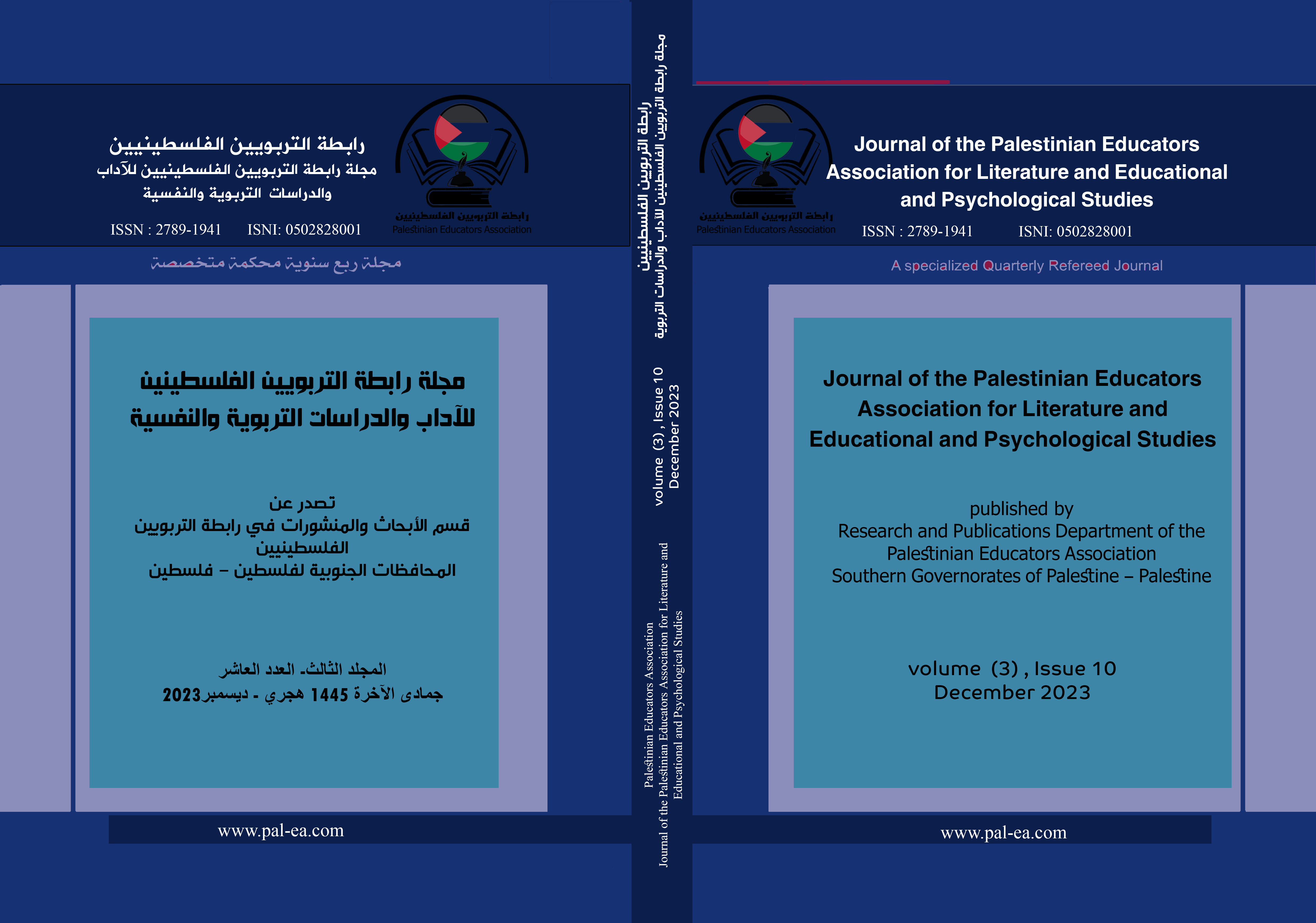Title: "Promoting Reflective Critical Reading, Creative Writing, and Text Analysis to Highlight the Values of the Palestinian Cause: An Analytical Study"
Keywords:
: (Critical and contemplative reading, values of the Palestinian issueAbstract
Abstract:
The study aimed to investigate the impact of incorporating reflective critical reading, creative writing, and text analysis in educational curricula on highlighting the values associated with the Palestinian cause. Researchers conducted an analytical study involving a sample of students from various educational levels. The study utilized a mixed-method approach, combining qualitative data through interviews and quantitative data through pre- and post-intervention assessments.Enhanced Critical Thinking: The incorporation of reflective critical reading encouraged students to critically analyze texts related to the Palestinian cause. Students demonstrated an improved ability to question, analyze, and evaluate information, leading to deeper understanding and engagement with the subject matter. Creative Expression: Integrating creative writing activities provided students with a platform to express their thoughts, emotions, and perspectives on the Palestinian cause. Through storytelling, poetry, and other creative forms, students were able to articulate their understanding and empathy for the cause, fostering a sense of connection and solidarity. Textual Analysis Skills: The study found that teaching text analysis techniques enabled students to deconstruct and interpret complex narratives surrounding the Palestinian cause. By examining historical documents, media representations, and literary works, students developed a nuanced understanding of the multifaceted aspects of the issue.
Downloads
References
References
● [1] Harry Barton Essel, Dimitrios Vlachopoulos, Albert Benjamin Essuman, John Opuni Amankwa. (2024). ChatGPT effects on cognitive skills of undergraduate students: Receiving instant responses from AI-based conversational large language models (LLMs). https://www.sciencedirect.com/science/article/pii/S2666920X23000772
● [2] Soumendra Sahoo, Ciraj Ali Mohammed. (2018). Fostering critical thinking and collaborative learning skills among medical students through a research protocol writing activity in the curriculum. https://www.ncbi.nlm.nih.gov/pmc/articles/PMC5990897/
● [3] Five classroom habits to build great reading skills. (2023). https://educationonline.ku.edu/community/five-classroom-habits-to-build-great-reading-skills
● [4] Kirsty J Freeman, Brid Phillips. (2021). The use of creative writing and staged readings to foster empathetic awareness and critical thinking. https://medicine.nus.edu.sg/taps/issues/the-use-of-creative-writing-and-staged-readings-to-foster-empathetic-awareness-and-critical-thinking/
● [5] Mahmoud Itmeizeh, Ahdi Hassan. (2020). New Approaches to Teaching Critical Thinking Skills through a New EFL Curriculum. https://www.researchgate.net/publication/341099336_New_Approaches_to_Teaching_Critical_Thinking_Skills_through_a_New_EFL_Curriculum
● [6] Berit Misund Dahl, Frydis Vasset, Marianne Frilund. (2023). Students' approaches to scientific essay writing as an educational method in higher education: A mixed methods study. https://www.sciencedirect.com/science/article/pii/S2590291122001437
● [7] Teaching and Learning Courses (EDTL). (2024). https://catalog.registrar.uiowa.edu/courses/edtl/
● [8] Michael J. Devlin. Boyd F. Richards. Hetty Cunningham. Urmi Desai. Owen Lewis. Andrew Mutnick. Mary Anne J. Nidiry. Prantik Saha. Rita Charon. (2015). "Where Does the Circle End?": Representation as a Critical Aspect of Reflection in Teaching Social and Behavioral Sciences in Medicine. https://www.ncbi.nlm.nih.gov/pmc/articles/PMC4383731/
● [9] Course Descriptions | English | UVU. (2024). https://www.uvu.edu/catalog/current/courses/english/index.html
● [10] English Literature. (2024). https://www.agnesscott.edu/academics/majors-minors/english-literature/index.html
● [11] Qualitative Data, Analysis, and Design. (2011). https://www.sagepub.com/sites/default/files/upm-binaries/43144_12.pdf
● [12] Christy DiFrances Remein, Ellen Childs, John Carlo Pasco, Ludovic Trinquart, David B Flynn, Sarah L Wingerter, Robina M Bhasin, Lindsay B Demers, Emelia J Benjamin. (2020). Content and outcomes of narrative medicine programmes: a systematic review of the literature through 2019. https://bmjopen.bmj.com/content/10/1/e031568
● [13] Lorelli S. Nowell. Jill M. Norris. Deborah E. White. Nancy J. Moules. (2017). Thematic Analysis. https://journals.sagepub.com/doi/10.1177/1609406917733847
Published
Issue
Section
License

This work is licensed under a Creative Commons Attribution-NonCommercial-ShareAlike 4.0 International License.
The Journal of the Palestinian Educators Association for Literature, Educational and Psychological Studies
E-issn: 2789-1941
Authors retain Copyright
The Journal of the Palestinian Educators Association for Literature, Educational and Psychological Studies allows Authors retain Copyright and grant the journal right of first publication with the work simultaneously licensed under a Creative Commons Attribution (CC-BY) 4.0 License that allows others to share the work with an acknowledgment of the work’s authorship and initial publication in this journal.
Provided they are the owners of the Copyright to their work, authors are able to enter into separate, additional contractual arrangements for the non-exclusive distribution of the journal’s published version of the work (e.g., post it to an institutional repository, in a journal or publish it in a book), with an acknowledgment of its initial publication in this journal.
Authors are permitted and encouraged to post their work online (e.g., in institutional repositories, disciplinary repositories, or on their website) prior to
and during the submission process.










